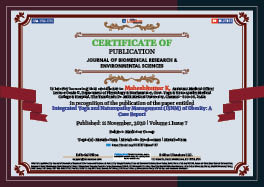> Medicine. 2020 November 11;1(7):297-298. doi: 10.37871/jbres1157.
-
Subject area(s):
- Metabolism
- Metabolic Syndromes
- Metabolism
Integrated Yoga and Naturopathy Management (IYNM) of Obesity: A Case Report
Venkateswaran ST1 and Maheshkumar K2*
2Assistant Medical Office/Lecture Grade II, Department of Physiology & Biochemistry, Govt. Yoga & Naturopathy Medical College & Hospital, The Tamilnadu Dr. MGR Medical University, Chennai- 600106
- Obesity
- Yoga
- Naturopathy
- Integration
A 45-year-old male patient with the nature of sedentary lifestyle, diagnosed with obesity (BMI-33.2 kg/m2) since 2013, was visited for Integrated Yoga and Naturopathy Management (IYNM) for the weight reduction in our hospital on November 2019. He had mild pain over the both knees with sleeping disturbances. We advised him a tailor made individualized protocol for the weight management for the period of 6 months. The results showed reduction in weight (107.9kg to 90.6kg), Body Mass Index (BMI) (33.2kg/m2 to 29.32kg/m2), total cholesterol (209mg% to 185mg%), triglycerides (172mg% to 113mg%), Low Density Lipoprotein (LDL) (102mg% to 94mg%), and High Density Lipoprotein (HDL) (44mg% to 48mg%). His knee pain minimized on discharge as observed on a Visual Analog Scale (7 to 3 points). He had an improved feeling of wellness and overall functional health. This case report suggests that lifestyle change in the form of IYNM is useful in the management of Obesity.
Obesity is a growing public health concern in modern societies. Physical inactivity and unhealthy diet have been identified as major risk factors for obesity [1]. Ample research has highlighted the role of obesity as a risk factor for a large number of chronic health complications, such as cardiovascular disease, hypertension, type 2 diabetes, stroke, sleep apnea and certain types of cancer, as well as in mood change and depression in obese individual. Yoga and naturopathy interventions have emerged as one of the evidence-based practices widely used across the globe. Previous findings on 72 obese adult males resulted in improvement in BMI, hip circumference, waist circumference, and skin-fold thickness following a 14 weeks of integrated yoga-based lifestyle change. It included yogic diet, asana, pranayama, relaxation techniques, meditation, and yogic counseling [2]. Yoga/meditation users with normal BMI appeared to be more satisfied with their body weight and shape than non-yoga/meditation users [3]. Non-pharmacological lifestyle interventions are recommended for management of various metabolic disorders like obesity. There are published reports of the significant effect of individual components of naturopathy like calorie limitation and therapeutic fasting on the weight management for obesity [4]. We report this case as a safe and effective possibility of Integrated Yoga and Naturopathy Management (IYNM) in the management of weight reduction for patients with obesity.
A 45-year-old male patient with the nature of sedentary lifestyle, diagnosed with obesity (BMI-33.2kg/m2) since 2013, was visited for Integrated Yoga and Naturopathy Management (IYNM) for the weight reduction in our hospital on November 2019. He had generalized weakness, fatigability, increased body weight, bilateral knee pain since 5 years. His body weight was found to be 103kg, height 176cms with a BMI of 33.2kg/m2. His pulse rate was 79 beats/minute and blood pressure 142/86mmHg. He was not having any metabolic disease history (diabetes/Hypertension/Thyroid dysfunction). Following a detailed case history, initial counseling and obtaining signed informed consent, the IYNM intervention was planned by expert yoga and naturopathy physician for the weight reduction. Considering the importance of yoga and naturopathy, an integrated program was designed including asanas (Surya Namaskar minimum of 10 rounds), pranayama (Kapalbhathi, bhasthrika and nadisudhi pranayama), relaxation techniques (Yoga nidra), kriyas (vamana kriya), combination of hydrotherapy (Steam bath), mud therapy (mudpack to abdomen), manipulative therapies (partial massage to abdomen), with calorie restricted diet. The therapies administered were modified based on the patient’s response assessed in the daily visit of the physician. Height was recorded on a stadiometer. Weight was recorded every week using an electronic research grade weighing scale. The lipid profile was checked at baseline and post-intervention in the same laboratory after 6 months of follow up.
- Pérez CE. Fruit and vegetable consumption. Health Rep. 2002;13(3):23-31. PMID: 12743958.
- Rshikesan PB, Subramanya P. Effect of Integrated Approach of Yoga Therapy on Male Obesity and Psychological Parameters-A Randomised Controlled Trial. J Clin Diagn Res. 2016 Oct;10(10):KC01-KC06. doi: 10.7860/JCDR/2016/21494.8727. Epub 2016 Oct 1. PMID: 27891357; PMCID: PMC5121695.
- Lauche R, Sibbritt D, Ostermann T, Fuller NR, Adams J, Cramer H. Associations between yoga/meditation use, body satisfaction, and weight management methods: Results of a national cross-sectional survey of 8009 Australian women. Nutrition. 2017 Feb;34:58-64. doi: 10.1016/j.nut.2016.09.007. Epub 2016 Sep 30. PMID: 28063513.
- Xydakis AM, Case CC, Jones PH, Hoogeveen RC, Liu MY, Smith EO, Nelson KW, Ballantyne CM. Adiponectin, inflammation, and the expression of the metabolic syndrome in obese individuals: the impact of rapid weight loss through caloric restriction. J Clin Endocrinol Metab. 2004 Jun;89(6):2697-703. doi: 10.1210/jc.2003-031826. PMID: 15181044.
- Gowda S, Mohanty S, Saoji A, Nagarathna R. Integrated Yoga and Naturopathy module in management of Metabolic Syndrome: A case report. J Ayurveda Integr Med. 2017 Jan-Mar;8(1):45-48. doi: 10.1016/j.jaim.2016.10.006. Epub 2017 Mar 16. PMID: 28318814; PMCID: PMC5377479.
- Maheshkumar K, Venugopal V, Poonguzhali S, Mangaiarkarasi N, Venkateswaran ST, Manavalan N. Trends in the use of Yoga and Naturopathy based lifestyle clinics for the management of Non-Communicable Diseases (NCDs) in Tamilnadu, South India. Clinical Epidemiology and Global Health. 2020;8(2):647-51. https://bit.ly/32w6YUz
- Thanalakshmi J, Maheshkumar K, Kannan R, Sundareswaran L, Venugopal V, Poonguzhali S. Effect of Sheetali pranayama on cardiac autonomic function among patients with primary hypertension - A randomized controlled trial. Complement Ther Clin Pract. 2020 May;39:101138. doi: 10.1016/j.ctcp.2020.101138. Epub 2020 Mar 5. PMID: 32379673.
- Geethanjali S, Venugopal V, Poonguzhali S, Maheshkumar K. Effect of clary sage oil as an aromatherapy on cardiac autonomic function among patients with premenstrual syndrome–A randomized controlled study. Obesity Medicine. 2020 Jun 1;18:100193. https://bit.ly/2ImtMiK
Content Alerts
SignUp to our
Content alerts.
 This work is licensed under a Creative Commons Attribution 4.0 International License.
This work is licensed under a Creative Commons Attribution 4.0 International License.



